Developers from Amplitude Studio were made famous from their debut project – Endless Space (ES), a 4X-strategy game set in space. With many of its features clearly inspired by Sid Meyer’s Civilization.
Their next game Endless Legend – was an Endless Space spin-off that took place on the surface of a planet. Something that made it resemble Civilization even more. This was followed in 2017 when Amplitude released Endless Space 2. A title which added a lot of interesting features to the original ES. A game that retained a strong resemblance to Civilization.
With such a clear pattern emerging from the development of this series, there was little wonder to learn that after all these years Amplitude finally decided to create Humankind, a direct competitor to Sid Meyer’s well-known series by Firaxis. Considering that Civilization VI featured districts built on separate hexagonal tiles from the city, Humankind feels even more like an inspired sibling.
Cultural shift
There are differences between both games. For starters, Humankind does not restrict players to a single civilization from those of recorded history. Even if sticking to one provides a for a better Fame bonus, it’s far more useful to change cultures with each new epoch. For instance; when starting with an agrarian bonus as Harappa, then turning to Ancient Greece when moving onto advanced science or raising one’s economy as Phoenician, then switching to expansionist as the Assyrians. Even if this means losing the ability to build the signature units and districts of previous cultures. In addition losing their bonuses to science or military power, for the remainder of the game.
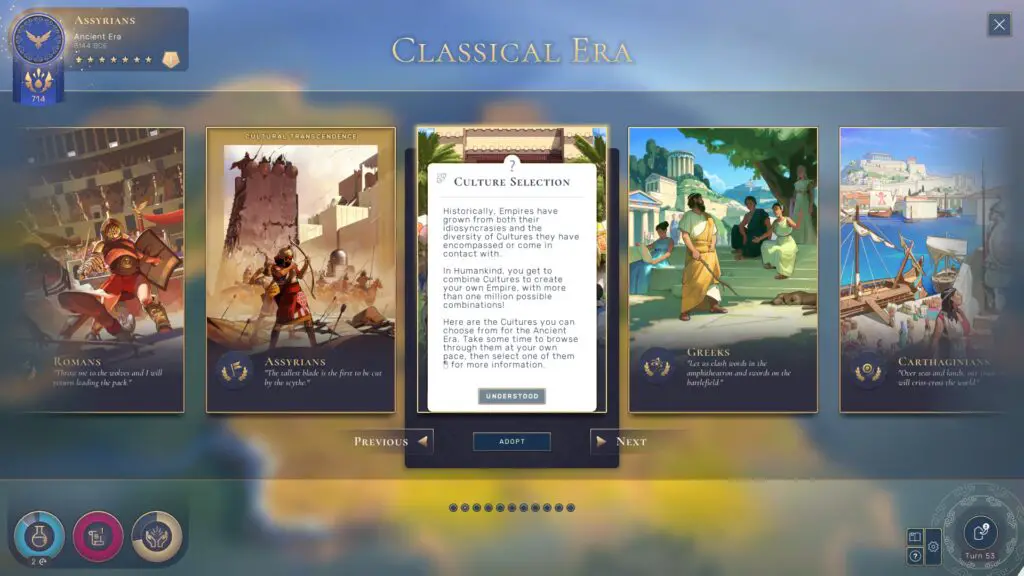
Unlike Civilization the transition to a new era in Humankind, is not determined by science alone. This is achieved with the accumulation of seven “Stars of Fame” out of a total of twenty one, across seven categories. Ensuring the balanced development of the player’s people. Whether the focus is on – conquering more lands, discovering new technologies or increasing population. While disregarding achievements that are of no interest.
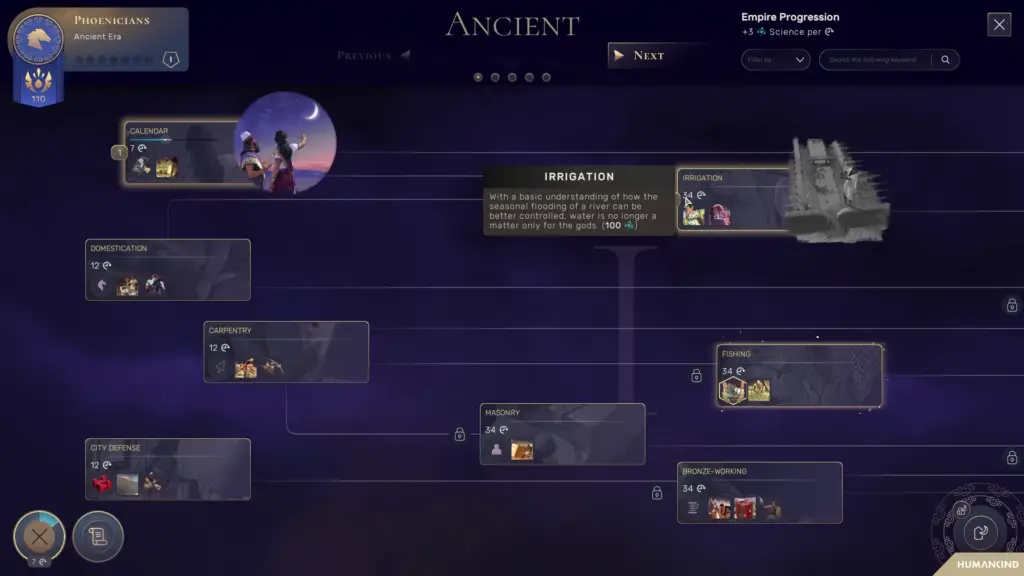
Maintaining a healthy investment in science is the key to gain much needed new technology. Even if it also requires investment in other areas.
Civics are also present but unlike the corresponding feature in Civ games, are not connected by trees. Instead, they become accessible depending on context. I.e. While waging war for several turns a pop-up question will ask – What is the preferred method of recruitment? Depending on the answer, new armies will become cheaper to produce or stronger in battle. If a new civilization with a new religion is encountered, a pop-up question will ask what level of tolerance is the player’s side have? To which a good reaction will lead to more influence. While a hostile reaction will increase internal stability and allow heretics to be burnt.
Tough Choices
The development of civilizations can be quite flexible. If the wrong choice is made, the player will have the opportunity to change their mind. An unwise action if attempted to often. Sometimes it would be better not to make a choice at all, as the adoption of each civic costs a significant amount of “influence” to enact. A finite resource.
Unlike in Civilization research does not solely rely on the work of scientists. New advances can be discovered if any one tech attached to it becomes known.
In addition, random events pop up that require some decisions to be made immediately. Cities can report the occurrence of torrential rains threatening to overflow a nearby river. The question then becomes whether to spend funds on building a dike or keep the money and risk a flood. Other such choices may include the whether to attend a play that celebrates the nation’s exploration achievements. Something that will boost science output for a few turns. Perhaps to alternatively proclaim that the population should work harder, to receive a reduction in unit costs for that period instead. And so on.
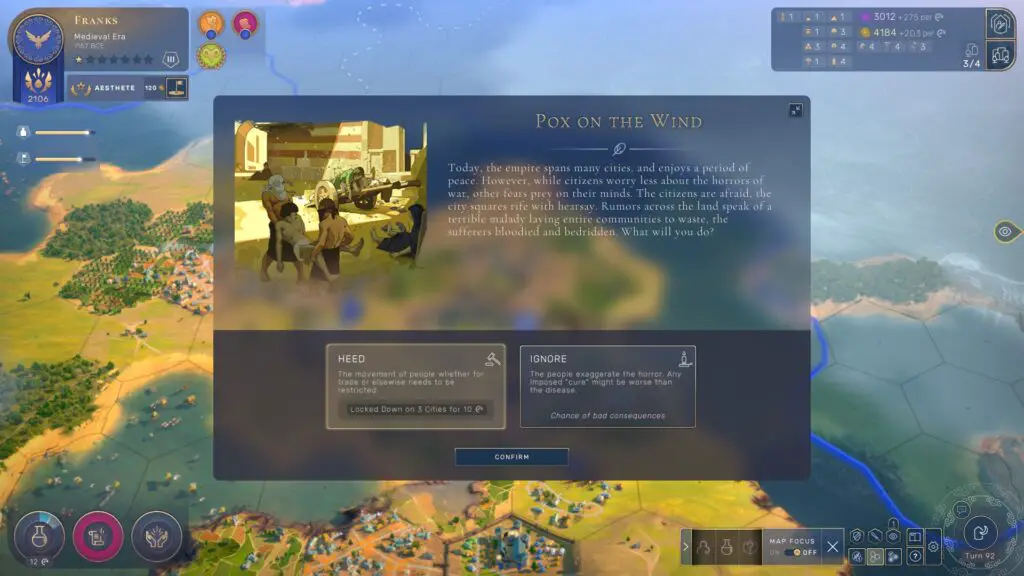
The upshot of a temporary bonus is balanced with a shift in the ideology of the player’s civilization (civic choices will do that too) in one of the four axes: Collectivism-Individualism, Homeland-World, Liberty-Authority, Tradition-Progress. With the shift granting a bonus too.
Traditions for example, strengthen morals and increase faith output. Progress on the other hand, increases science output. Individualism bias provides a bonus in commerce, Collectivism – in production. Sometimes keeping a slider in the center is the better strategy – with balanced politics giving a stability bonus that is useful for a city’s development.
My Lands
Developing cities and infrastructure is another aspect that does not follow previous titles. Unlike in Endless Legends where the map was divided into “territories”, settlements would control exactly the territory where it was built. Regardless, if it was in the center or near a border.
However in Humankind outposts can be built on territories and “attached” to cities. Resulting in the outpost becoming the administrative center for all territory attached to it. Allowing the building of separate districts with the ability for citizens, to be ordered to gather resources from those hexes. A powerful feature when used to attach several outposts to one city. Potentially allowing for one city to control half of the country. Neat!
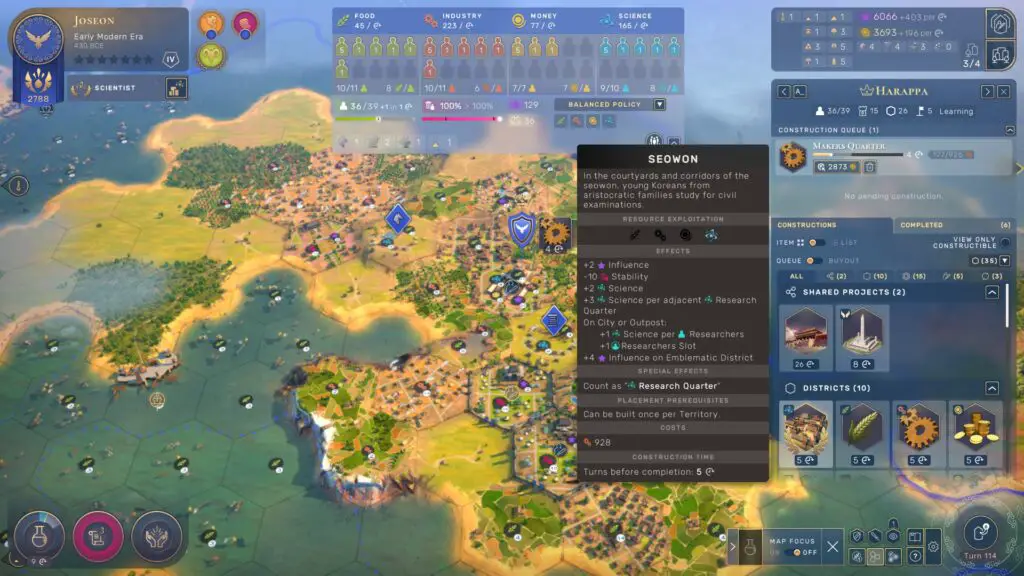
Before becoming too excited, it should be noted that attaching territories costs influence (or money if the Land Rights civic has been chosen). With the cost becoming higher the more territories have been attached. Not a luxury but a necessity, because exceeding the city number cap results in huge penalties, especially to stability.
Building for Ages
Stability is very important for building districts. More districts lower this attribute and thus lower overall efficiency in the production of all resources. To raise it, city improvements or forts need to be built. A special type of district that raises defense and spirit of a city’s citizens.
A district’s production is determined not only by the hex it was built on but by neighbouring tiles too. Even neighbouring districts, depending on whether they are of the right type. Thus optimization through correct tile choices becomes quite significant. This can devolve into a chore, as there is no clear way to calculate the best combination– no filters, no tools. Except for rare cases when super profitable tiles are highlighted.
While unique and “Emblematic” districts can be built once per territory. World Wonders can only be built once per game. These were completely inspired from Civilization. This time at least if a faction does not complete their wonder like the Pyramids before another faction does, there will be no wastage in effort. For once a wonder is started, influence can be paid to lock every other faction from building it. In addition several cities can cooperate to build Wonders together, reducing its construction time greatly.
Explore and Fight
Armies have their nuances too. They can move along the river ignoring terrain penalties. Though entering a river tile will end the army’s turn there and then. Unless a bridge is present.
A nuance affecting tiles is that they have a height level. From high tiles an army can see further. While units gain additional attacking power. Some hex boundaries are impassable. A useful feature for cities as cliffs make for natural defense lines, creating their own tactical nuance on the battlefield.

Combat in Humankind simulates actual battles on the terrain where contact was made. Each “wondering army” includes several units which are deployed to a neighbouring tile when attacking an opponent. The battlefield can Incorporate additional surrounding titles when both attacking and defending armies move and attack each other for three rounds during a “global” turn. After the turn ends the battlefield persists allowing for additional reinforcements to be sent or artillery support to be fired from beyond the boundary of the encounter.
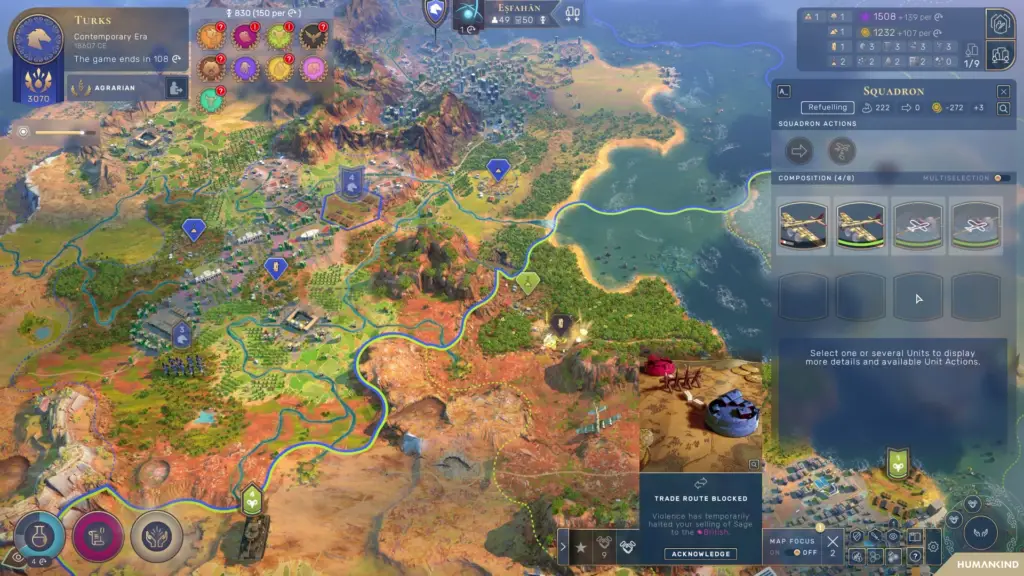
War is not the only thing armies are good for. They can scout and collect “curiosities” that increase money, tech or influence. In rare cases, even uncovering a powerful new unit.
Armies begin as the most important asset of a civilisation. Especially during the Neolithic Age, when no cities or outposts have been founded. Armies collect food and grow in strength, creating more units. With well-planned movement (and a bit of luck) a formidable force can be cultivated bringing an advantage in the next era.
Towards the end of the game opportunities for armies diminish. With there being no more wild animals to hunt and all free peoples (a combination of Civ’s barbarians and city-states) eventually becoming allies. War becomes the singular reason for the existence of armed formations.
Diplomacy (and other means)
For a militaristic or conquering player, it’s not a simple exercise to go to war. The nation’s support is needed, only growing when diplomatic propositions are rejected or other nations take unfriendly or hostile actions. It can require a fair amount of bullying from neighbours to have them declare war or provide an excuse to attack them. There are some options at least to harass other nations even during peace.
For example, through skirmishes another leader’s armies can be attacked. Even if that neighbour is peaceful and both sides are not at war. Causing the aggrieved side to demand reparations. These can be ignored. A useful mechanism that allows war support to grow. For protection against opponent’s expansion settlements can be created near opponent’s borders to stop their future expansion. Independent peoples can be swayed to the player’s side. Maybe even eventually assimilating them. Religious and cultural influence can also be used to annoy neighbouring nations.
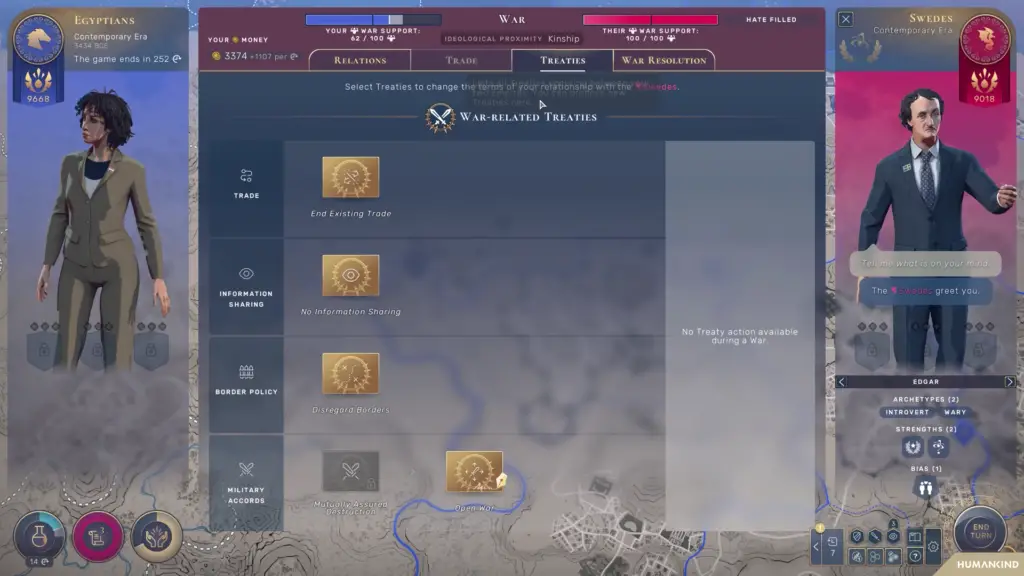
Of course, these tools of brinkmanship work both ways. To be “oppressed” can be a useful opportunity to use armies, otherwise wandering aimlessly. The more justified a war is for the player, the bigger the final “war score” will be when if victory is achieved. Of course, destroying enemy units and occupying cities will also help. That will allow more reparations and cities to be demanded upon victory. Achieve a large enough victory offers the chance of making the losing side a vassal.
Peaceful coexistence is also an option. Treaties can be signed allowing for open or closed borders. Skirmishes can be forbidden. Maps exchanged. Even luxury resources traded. Offers from neighbours can be countered, to further “sweeten” an prospective deal. Though the size of that “sweetness” is for some reason decided automatically by the game.
The main difference from diplomacy in Civilisation has to be that only a limited number of offers can be made in a period of time. With an emphasis on trying to balance offers and demands. There is a limit of only one per turn at each opponent. With the cost always determined automatically. There is even a cool-down – forcing players to spend influence if they want to make another offer during the next turn.
For Aesthetes
Aesthetically Humankind has the least differences from Civilization. Of note is customization. With the game taking its own path in allowing flexible civilizations, having only one historical figure to represent the faction over the course of the game, would not do. Thus – welcome to the special editor that allows players to create their own custom-made Avatar!
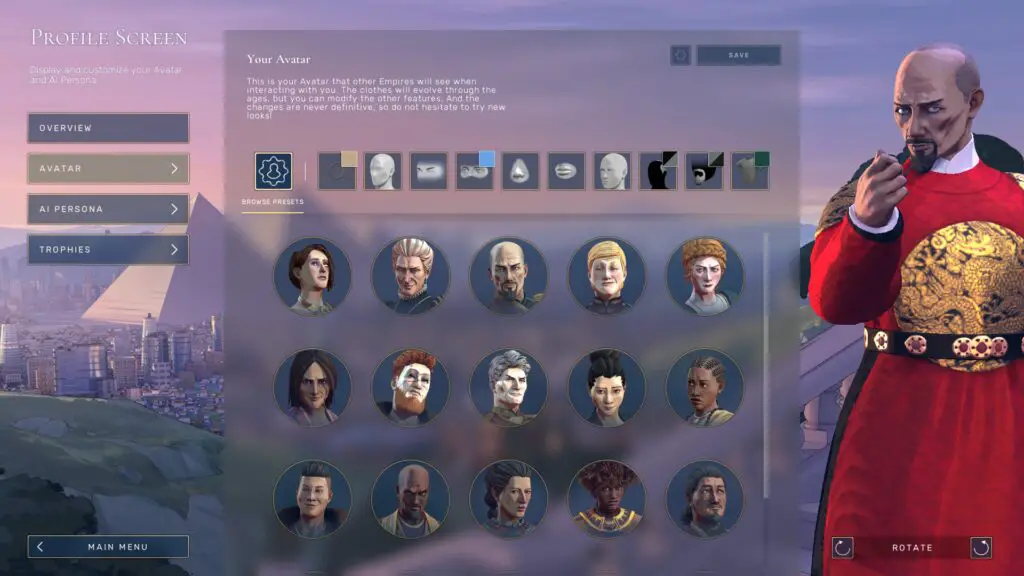
When your alter-ego appears on the diplomacy screen along with other leaders, they can become quite chatty. Greeting allies with respect and scorned enemies with disgust. You can actually choose one of a few “personalities” to spice your avatar’s responses somewhat.
A fun detail – when you enter a new epoch, will see the clothes of the avatar change to match the current culture. The look of your cities also adjusts to meet historically accurate perceptions (more or less) for the nation chosen. This way the aesthetic of your nation changes step-by-step from that of a savage in animal skins to contemporary fashionista.
As for the narrator, I have mixed feelings. Some of the snide comments made to show how certain civics are useful for the appropriation of goods, were on spot. Others sounded childish.
How far will you push Humankind?
Overall, Humankind is a good competitor to Civilization, that to be honest has become rather stale over the years. It’s great that this game advances and even challenges Civ’s conventions. This newcomer introduced actual battles and a more flexible development of a nation. It is also great to be sure that no one will take away your Wonder once work commences!
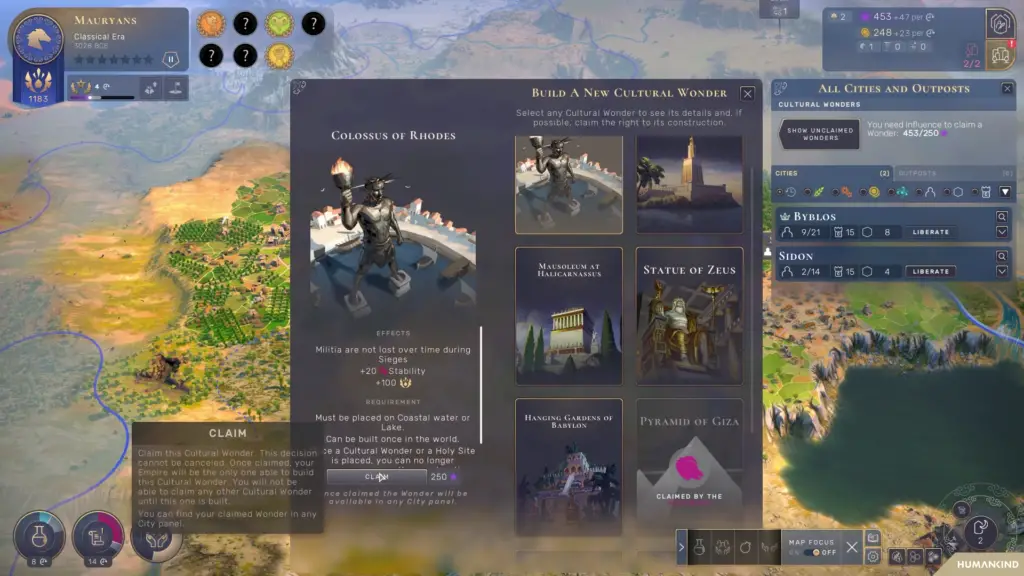
But this game still needs more polish. Especially in terms of the interface. I would have liked to have seen how many points, movement would cost. Only the number of turns can be seen if the cursor points far enough ahead but up close it’s hard to make precise calculations.
Speaking of calculations, the need to calculate the optimum place for an outpost in my head, was well head spinning. Sometimes the button for placement [mode shows how many resources and food an outpost would gather] simply did not work!
It would have been helpful to have an interrupt option for my armies to stop scouting after discovering nearby curiosities or enemies. Too many times curiosities popped up right under my army’s nose only for the unit to go past it one hex to the side. The alternative was to only move units one hex at a time?
The same could be said about the placement of the districts. I could not even add one to the building queue if I wanted to build it far from the city. Only being able to build it with when another district was to be built that was bound to the required tile. All these nitpicks individually were small but when combined altogether, a large amount of annoyance to the experience.
Balance in the game was quite unpolished too. As already mentioned, it was possible in Neolithic Era to achieve quite a head start by accumulating food in quick-time or to jump to an Ancient Era early or reach a better culture (like Harappa) in the early game.

Some events and results of their decisions did not quite make sense. The bonus from Authority axis ideology felt useless but looked like the result of bad balancing.
Still I remind myself which 4X strategy released today was done so in a fully polished and fully-formed state? I’m sure patches and DLCs will fix most of these problems. There is also hope with the modding community. After all, Humankind was made to be mod-friendly and even from the start has a built-in map editor.







